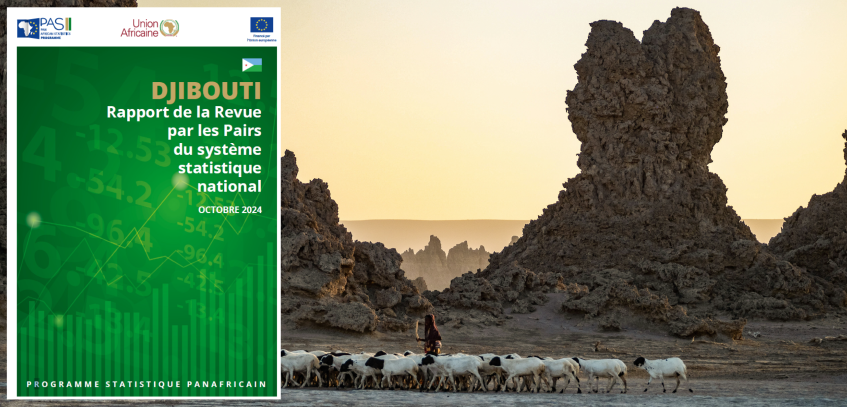In a significant step toward improving statistical governance, Djibouti hosted a peer review of its National Statistical System (NSS) from September 22 to 26, 2024. This initiative, led by the African Union’s STATAFRIC and Eurostat through the Pan-African Statistical Program (PAS II) funded by the European Union, brought together experts from across the continent to assess and provide recommendations for strengthening Djibouti’s statistical framework.
Key Results and Achievements
The peer review, conducted by representatives from Benin and Côte d’Ivoire, highlighted Djibouti’s considerable progress in modernizing its NSS. Key milestones include:
- Institutional Development: The establishment and operationalization of the Institut National de la Statistique de Djibouti (INSTAD), which now serves as the central coordinating body for national statistics.
- Enhanced Data Quality: The successful implementation of the 3rd General Population and Housing Census (RGPH-3), which was fully digitized, with preliminary results available within three months of data collection.
- Improved Coordination: Strengthened collaboration between INSTAD and sectoral statistical entities, supported by the newly established Comité des Programmes Statistiques et Méthodologies (CPSM).
- Policy Integration: Statistical data has been increasingly utilized to guide national strategies such as Vision Djibouti 2035 and the National Development Plan (PND) 2020–2024.
Recommendations and Future Directions
Despite these advancements, the review identified areas for improvement and made 40 actionable recommendations. These include:
- Updating Djibouti's statistical legislation to align with international standards and enhance data-sharing mechanisms.
- Strengthening financial and human resources for sustained statistical production.
- Developing a National Data Quality Assurance Framework to ensure consistency across sectors.
- Leveraging digital technologies for broader dissemination of statistics and enhancing public access.
Stakeholder Collaboration
The peer review was made possible through the active participation of key stakeholders, including:
- Djiboutian Authorities: Led by H.E. Ilyas Moussa Dawaleh, Minister of Economy and Finance.
- International Partners: Representatives from the United Nations and the World Food Programme provided valuable insights.
- INSTAD Leadership: Dr. Ibrahim Abdi Hadi, Director General of INSTAD, and his team played a pivotal role in coordinating the review.
Looking Ahead
The findings of this peer review mark an important milestone for Djibouti in its journey toward achieving a robust, transparent, and efficient statistical system. The implementation of the recommendations will be critical in ensuring that Djibouti’s NSS continues to provide high-quality data for evidence-based policymaking and sustainable development.
Click here to access the full report
Together, we are building a robust foundation for data-driven development in Djibouti.









